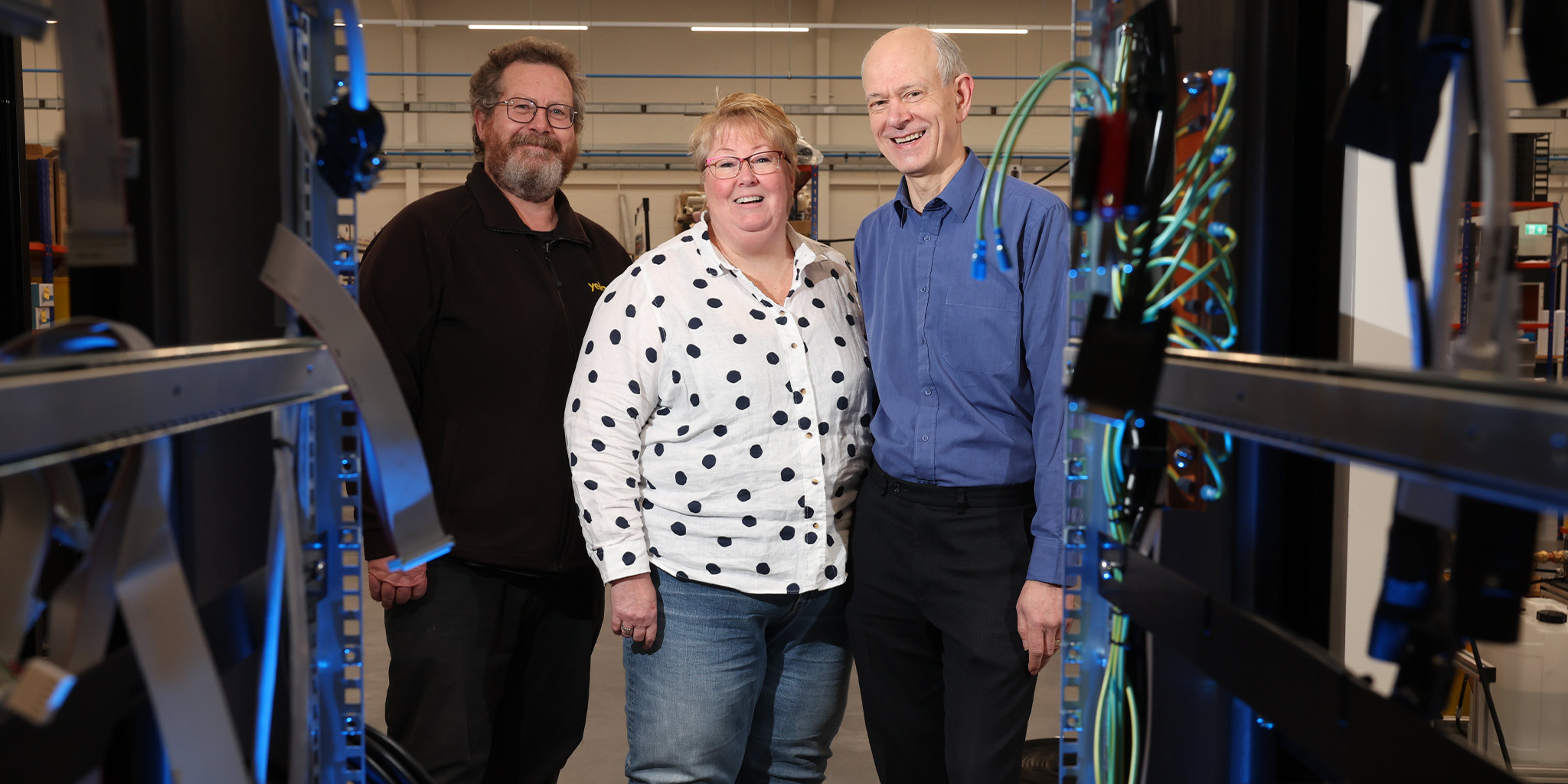Overview of Yelo over 40 Years
In the beginning...
In the shadows of a city reeling from violence, the loss of 1,500 jobs during the notorious demise of the Delorean factory, and an unemployment rate of 20% – just five points less than that during the Great Depression – two local businessmen were launching one of the country’s most promising enterprises. Richard Furey and Alan Watts met when they worked together as engineers for a business that folded at the same time as the Delorean factory. With £100 and huge aspirations for more despite the political backdrop, the business partners launched Systems Solutions Limited in January 1983. Today that firm is known as Yelo.
“We began as a consultancy business with £100 and an old Apple computer, going around companies showing them how they could use technology. It was a dark time. Unemployment was high, no-one wanted to invest here. It was pretty dead,” says Richard.
Impressively the business attracted custom from Tayto, Papermill, and Swan in its early days, the latter of which was renowned at the time for its kettles and Teasmades. Nortel in Monkstown also beckoned the duo’s services and then Swan enlisted them for testing its products, setting the business on a new path.
“Over two to five years after that, we started turning our advice into practical projects,” Richard continues. “We did lots of weird and wonderful things, all of which were very much one-off products and our team grew to eight people in five years.”
Growth of the business...
The company consolidated the mastery behind those bespoke products to create a solution of building blocks that could be used more universally, with an investment of £250,000. That move set the wheels in motion for fast growth. In 1991 it sold almost 50% of the business to angel investors. That partial buyout coupled with fresh funding saw the company go on to launch its product at a trade show and by 1992 its turnover sat at £1.2m.
“We increased our staff to 30 and 95% of our business was in the mainland UK. We grew so quickly that it nearly broke us when the recession set in and costs went up. Our income fell and we nearly went bust in 1993,” Richard says.
With support from the bank and a management consultancy, the company came back stronger after that blip, and at the turn of the millennium, Yelo was sold to a Canadian firm. Ten years later a management buyout put it back in Richard’s hands to “turn it into what it is now”.
That move also saw Lynn Good, finance and administration director, join the business from Canada helping the 21st-century Yelo thrive alongside fellow director David Sinclair and a team of 40 staff.
Alan Watts departed the business in 2005.
Describing Yelo’s inner workings and services today, Richard explains: “The product we developed at the beginning of the ‘90s became the entry to what we do now. That was general-purpose test equipment that tested many things, for example, Heartsine defibrillators, a cluster of products for medical companies in Galway including foetal heart monitors, smoke detectors and more. We also do work for Schnieder Electric for domestic heating controls, testing one every 45 seconds.”
The firm’s other high-profile clients include Thales and BT while its product portfolio traverses a selection of products; from household essentials to the downright futuristic.
The Future...
Laser diodes are a new market for Yelo, which operates from its suave 25,000 sq ft facility at Trooperslane Industrial Estate, Carrickfergus. These diodes can be used in high-speed communications in what Richard says is a “multi-million dollar market mainly based in the US”.
He adds: “As long as we invest heavily in engineering for what’s next we’ll keep going."
“One of the big growth areas is LIDAR used in autonomous vehicles. It is the eyes of the vehicle, a bit like an optical sonar that builds up an image of what’s in front of a car – detecting the difference between a curb you’re going around and someone stepping off that curb. We’re getting involved in that and the challenge now is to do it at the right time, which is a mix of experience and luck."
“When you do R&D, the key thing is learning when to realise that you’ve gone as far as you can with something.”
Over the past four decades, Richard and his team have encountered many economic and political challenges. Is 2023 going to be any different given the pressures of the war in Ukraine, the enduring wake of Covid-19, and Brexit?
“There have been more difficult times than today,” he continues. “I think back to when we first started – things were very tough, unemployment was huge, and nobody wanted to know Northern Ireland. Today it is the worst time for the retail industry and that’s a combination of a backdrop of ten years of squeeze coupled with energy, then the war in Ukraine – sort of a quadruple whammy. It certainly, in terms of a squeeze on living standards, seems worse. I cannot in 40 years remember when we needed food banks. This is a very tough time, tough from a business perspective, looking at cost increases and salaries but our outlook is not nearly as negative as it is for individuals. Things are moving forward, it’s going to be a blip for companies like us but we’ll manage. “We are often testing things that won’t be used for two to three years which acts as an inherent buffer.
“There is a huge breadth of engineering capability which allows us to turn our hand to things, whether that’s wind farms, solar panels, or killing fish humanely. There are many opportunities ahead,” he says



